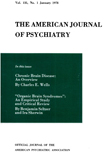THE EMPTY NEST: PSYCHOSOCIAL ASPECTS OF CONFLICT BETWEEN DEPRESSED WOMEN AND THEIR GROWN CHILDREN
Abstract
In summary, the 14 empty nest patients studied in detail were women who entered the hospital with a comparable degree of depression. They all shared a common inability to deal successfully with the termination of child rearing and had difficulty in adjusting to their status as childless mothers. In half the sample, consisting of seven overt conflict patients, the difficulty was characterized by violent and frequent arguments with their children. In the seven latent conflict patients, the difficulty found expression in a vague, undefined kind of dissatisfaction.
The kind of conflict manifested by the total sample seemed to be related, in part, to a number of social and environmental characteristics. A higher education, postponement of pregnancy for a year or more after marriage, espousal of American values and traditions, friends outside the family, satisfying work experience and, most important of all, the presence of a husband were all consistent with the manifestation of latent conflict between the patients and their children.
Conversely, a grade school education, early marriages followed almost immediately by pregnancy, adherence to European traditions, few or no friends outside the family, no work experience and the absence of a husband were all factors associated with overt conflict. While the sample of this pilot study is too small to draw any firm conclusions regarding the impact of the cessation of child rearing on all depressed patients, our findings suggest that it is important to differentiate the extent and locus of conflict in the relationship between depressed women and their children. The reestablishment of a healthy relationship depends in large measure on the careful diagnosis of the existing conflict, which in turn dictates the type of therapy to be undertaken.
Access content
To read the fulltext, please use one of the options below to sign in or purchase access.- Personal login
- Institutional Login
- Sign in via OpenAthens
- Register for access
-
Please login/register if you wish to pair your device and check access availability.
Not a subscriber?
PsychiatryOnline subscription options offer access to the DSM-5 library, books, journals, CME, and patient resources. This all-in-one virtual library provides psychiatrists and mental health professionals with key resources for diagnosis, treatment, research, and professional development.
Need more help? PsychiatryOnline Customer Service may be reached by emailing [email protected] or by calling 800-368-5777 (in the U.S.) or 703-907-7322 (outside the U.S.).



